Loretta review – Compelling 1940s pulp noir thriller offers some killer choices of just how bad you want to be
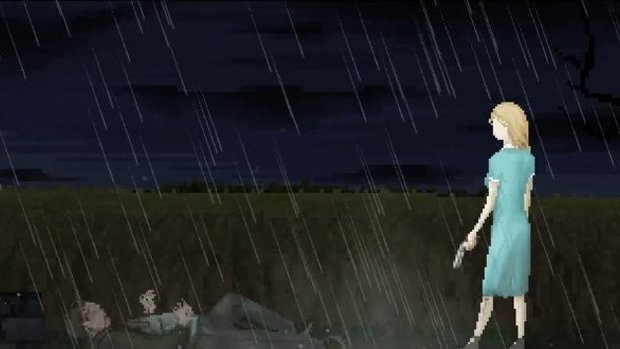
- 0 Comments
I can never resist a good killing spree (in a video game!), and the point-and-click psychological thriller Loretta isn't shy about offering up ample opportunities to satiate that desire – or quell it, if you'd prefer. Playing the titular character, a fed-up, cheated-upon housewife living in the 1940s southern U.S. and longing for the finer things in life, you decide through dialogue and action choices just how far down the spiral of madness she will go. The game's strong points are its riveting story, detailed pixel art and colourful script that throws you into the fast-talking, cynical world of film noir with a flourish. And whilst some small elements like mini-games in between scenes feel tacked on, for the most part Loretta delights in allowing you to explore its dark, seedy narrative, and get away with murder – that is, if you want to.
It's safe to say that however you want to play the game, Loretta's husband Walter is doomed. The game proper starts with the housewife admitting (to herself, and to the player) she's murdered him. You're then thrown into a playable flashback to see how this initial crime took place – although there are plenty of options in terms of dialogue, so it isn't a straight path to Walter's demise. As Loretta, you move about each side-scrolling scene using the keyboard, and certain items (say, oh, an axe or a shovel!) can be interacted with – hotspot names flick up to be clicked on when you hover over them. Some objects Loretta will simply describe or give context to, while others you'll have the chance to do more with, such as picking them up (you have an inventory – your handbag) or using them. Occasionally the mouse interactivity with items is a little fiddly, but for the most part it's pretty straightforward point-and-click fare.
After Walter’s swift exit, the game explores what Loretta does next. There are multiple endings, and the way you'll find each one is through those choices you make along the way. Do you hide your crime carefully, or go all out wildly murdering whoever figures out what you've done? (Guess which I did?) Thankfully you don't have to play the entire game again to explore different options. Instead you can go back to specific scenes to try new actions – although you will then have to play through the rest of the game from there to see their result. At least the dialogue and sometimes entire scenes you've already seen before are skippable.
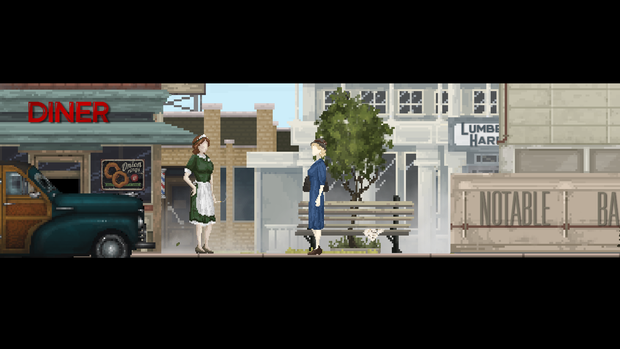
Whilst the game allows you to have a fair bit of agency as to what happens to our murderous housewife, it does pull you somewhat along its inevitable path – try and kill a police officer outright, for example, and the result is entirely predictable (and fully deserved). If you die you'll then be transported back to a few dialogue lines before to try again. Loretta has ambitions for its heroine, and whether that means “saving” her from a complete downward spiral or letting her go to rot, it wants you to see it through till the end.
There's no voice acting in Loretta, but the game's dialogue is full of the kind of pithy one-liners and brooding monologues you'd expect from any good noir. There are some sensational lines I couldn't help but read out aloud in an emotional southern drawl – at times the dramatic twists and intense exclamations made me feel like I was playing a Tennessee Williams melodrama. Loretta knows this full well and delightfully hams it up in this regard; there were many times I found myself chuckling gleefully out loud out at the blunt, over-the-top dialogue options I could choose (and always did).
Part of the fun stems from the strong character building, particularly with the lead. Not since inkle's Overboard! have I played as a heroine who just doesn't give a damn anymore, and it's a lot of fun to go down those lines, if you decide to. That said, the rest of the cast are very well-written too – no one, from Walter's dopey mistress Margaret to Loretta's curmudgeonly neighbour Mr Morgan, is presented purely in black and white, good or bad. There are shades of grey you'll discover in all of Loretta's ensemble through different dialogue options and alternate playthroughs, adding plenty of depth overall. You can play the protagonist herself as far less bloodthirsty and crazy, of course, which I did do eventually. Whilst a little less enjoyable to be more restrained, it doesn’t feel like you’re playing a completely different character and some of the choices open up slightly different pathways, which are fun to discover.
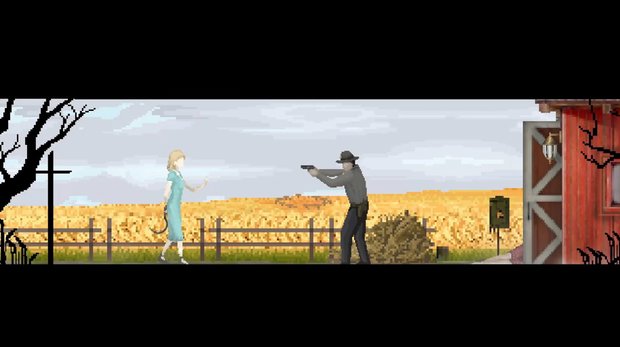
Presented in a narrow horizontal viewscreen with large black bars on the top and bottom, the locations and art style help bring to life the dusty, tired existence Loretta is trying to escape and the shocking violence that follows. She lives on a farm in the American South, enveloped by bright yellow fields of wheat. The house feels like a character in itself: cold, falling apart, and crumbling with a dark, foreboding basement full of dead rats. As Loretta's madness takes hold throughout the story, elements of the house will decay further or even mysteriously move to a different area entirely in a nice narrative touch. In your brief travels elsewhere you'll explore a run-down bar with shady customers, as well as a more dreamlike area reminiscent of The Shining, which has you wondering just what is and isn't real anymore. The eerie mix of hand-drawn illustration for character close-ups and pixel art for objects and backgrounds only adds to the uncanniness of the narrative.
Of course, it wouldn't be a thriller without a bold soundtrack and Loretta doesn't disappoint. Distorted instrumental chords increase erratically as a sudden new plot twist comes to the fore. Elsewhere, Chopin's elegant “Nocturne in E Flat Major” plays out dreamily as our heroine wafts in and out of consciousness after Walter meets his end. Sometimes the game lets its sound effects evoke their own atmosphere. The deathly silence in the kitchen except for the creaking floorboards and hollering wind outside helps convey how isolated and alone Loretta is – perhaps explaining how her rotten thoughts take fruit so easily.
The main gameplay element can be found in puzzles and mini-games between story scenes. You might have to piece together fragments of a picture relevant to the upcoming scene by rotating them, or stop encroaching words from making their way to the centre of the screen by swiping them with your mouse. The games mainly feel tacked on and unnecessary, and sometimes their connection to the narrative isn't really made very clear, but given Loretta’s tenuous grip on reality, perhaps their obscurity is the point.
There are a few times you'll need to use an object stored in your inventory, but there's no trying everything with everything; the game will tell you when and where it needs to be used. One particularly frustrating task sees you try to pick a lock to escape being chained up. There's no real explanation of what to do here – it feels like you have to move your mouse as the lockpick around the circular hole, tapping until you find the right place for the lock to turn completely without the pick breaking. But there didn’t seem to be much logic in working out whether I was any closer or further away from the spot I needed to tap, with the sound cues being more off-putting than helpful. The mouse sensitivity also makes it difficult to tell exactly where to tap, and you need to be incredibly precise or else your pick will break. This resulted in me having to repeat the same scene several times before I cracked it. Thankfully the puzzle isn't a recurring one, so it can be moved on from fairly quickly.
Final Verdict
It took me roughly four hours to finish a single playthrough, and Loretta's endings all go in some dark, murky places, though some are definitely more chilling than others. But instead of it feeling gloomy, I found there was a lot of fun to be had in the player agency offered throughout such a dramatic story carried by its berserk lead. A lot of games offer choices these days, but few make you feel giddy at their possibilities. That Loretta does so is a testament to its strong writing and sense of place, cemented by some creative music and art choices. Murder never felt quite so delicious.
Hot take
Loretta is a pleasingly chaotic and entertaining romp through the best tropes of film noir – but it's the player who decides just how dark things get.
Pros
- Absorbing narrative full of twists and turns right out of a Hitchcock playbook
- Dialogue is on point for the era and genre, full of passion and pithy comments
- Mixture of pixel art and illustration adds to the eerie atmosphere
- Lots of different ways to play allows for plenty of creativity (and evilness)
Cons
- Mini-games feel unnecessary and at times confusing
- Mouse sensitivity makes it hard to click on items sometimes
- Have to replay lengthy parts of the game again to find all different endings
Laura played Loretta on PC using a review code provided by the game's publisher.






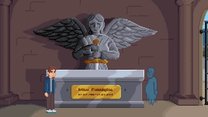


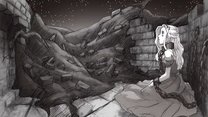

0 Comments
Want to join the discussion? Leave a comment as guest, sign in or register in our forums.
Leave a comment